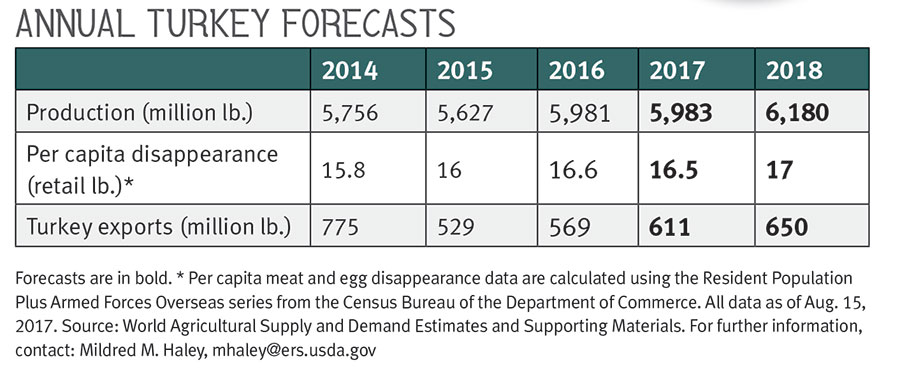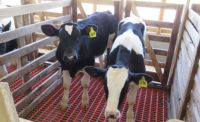This year, the turkey industry hopes fall will be a season in which it finally begins to shake the after-effects of market disruption that dates back to the 2015 highly pathogenic avian influenza (HPAI) outbreak. Devastating to the producers and processors affected, the HPAI had an impact that reached far beyond the roughly 3 percent of anticipated 2015 production lost to the disease.
Prices in some markets soared during the latter half of the year in anticipation of shortages that never fully materialized. More damaging is the fact that many export markets were closed by the outbreak for significant portions of the year and some key markets, most notably China, still had not reopened as of mid-September. Exports still have not returned to their pre-HPAI levels. That, combined with greater supplies of other proteins, has had a negative pull on the turkey markets for at least a year now.
The industry is making concerted efforts to spur demand, and a strong showing during the industry’s most important season (by historical standards) would provide a definite boost going into 2018.
USDA turkey breast bonus purchase
Another force that may help shore up the market is the bonus purchase of nearly 20 million pounds of turkey breast meat announced in September by the U.S. Department of Agriculture (USDA). Scheduled for delivery from November through July, the sliced turkey deli breast meat will serve several key purposes. It will fill the need for a popular, nutritious lean protein for school lunches and other federally supplied food and nutrition assistance at a historically competitive price; it could help spur demand for turkey meat among younger Americans; and it will reduce turkey stocks, hopefully helping stabilize prices for breast meats. NTF during the summer requested USDA make this purchase, and we are very appreciative of Secretary Sonny Perdue’s strong response and the vital support of the Agricultural Marketing Service.
Protecting our investments
Preventing another costly HPAI outbreak is one of the prime reasons NTF is urging support for the proposed Animal Pest and Disease Prevention Program. An outbreak of a foreign animal disease has the ability to cripple the entire agricultural sector and have long-lasting ramifications for the economic viability of U.S. livestock production.
Modeled after the highly successful plant pest and disease management and disaster prevention programs, a new Animal Pest and Disease Prevention Program (APAD), administered by APHIS, would be established to provide a proactive and concerted preventative “boots on the ground” effort focusing on early detection and rapid response to protect the nation’s animal agriculture industry. NTF is conferring with Agriculture Committee staff on the details, as members of the committee write the 2018 Farm Bill.
Building upon the 2014 Farm Bill’s authorization of the National Animal Health Laboratory Network (NAHLN), APAD will bring together the federal government with states, industry and universities to reduce the impact of high-consequence animal diseases, rapid detection and response, develop disease prevention and mitigation including vaccines, prevent foreign animal diseases entering, and identify and support critical research needs.
As NTF Government Affairs Senior Vice President Damon Wells noted, “Our hope in a program like this is that we’d be more likely to identify a problem earlier, eradicate it quickly and ultimately fix financial problems on the back end before the outbreak becomes as big of a magnitude.”
Open access
American poultry’s step-by-step approach to regaining market access back into China after being banned because of a single HPAI detection has focused first on resolving questions about the equivalency of China’s production and inspection system. Addressing those assurances and USDA ability to confirm inspection of Chinese poultry arriving in the U.S., the American goal is for access to China’s poultry market. But larger geopolitical issues and overall trade policy will have an impact on the pace of progress. Even with access for turkey product, our regaining the $71 million peak value of U.S. turkey exports to China from four years ago will take time to rebuild sales arrangements to recapture that market.
The government of South Korea has lifted its ban on imports of U.S. poultry products, including fresh eggs. Korea had imposed the ban in response to a detection of highly pathogenic avian influenza in March of this year in a commercial poultry flock in Lincoln County, Tenn. While the ban has been lifted, NTF is actively working to resolve “hatched and raised” language that persists.

NAFTA neighbors
President Trump’s efforts to renegotiate NAFTA present challenges for the turkey industry as well as all meat and poultry producers. The Mexican export market remains vital, accounting for more than half of all turkey exports, and NTF has underscored its economic importance to the administration. The new round of negotiations also presents an opportunity to address Canada’s quota and tariff system, which has hampered efforts to export turkey to our northern neighbor. Government negotiators have repeated the intention to have this process concluded by the end of 2017. Negotiators reconvened in Mexico City for a second round of talks and then turned to Canada in late September to conclude what the Office of U.S. Trade Representative expects to be an accelerated and comprehensive process.
Worker resources
NTF has been working with House Judiciary Chairman Rep. Bob Goodlatte (R-Va.) on his legislation for an agricultural guest worker program. Goodlatte recognizes the need for a stable reliable workforce and NTF is actively supporting his legislation that addresses the needs of the entire business community, not just the seasonal agricultural industry. NTF members have pledged support for solutions to challenges of labor availability facing the industry. The turkey industry supports immigration reform that includes policies and provisions to ensure a strong and durable immigration system that meets the needs of the American economy.
While there are worker shortages in many industries, turkey processors are experiencing acute shortages. Available labor in the rural, low-unemployment areas will not fill all plant positions. Local residents are always the first sought for hiring. NTF supports an expanded visa program for full-time, low-skilled workers, which is addressed by the Goodlatte legislation as well as in the version by Sen. Jeff Flake (R-Ariz.).
Additionally, employers using the federal government’s verification system in good faith should have safe harbor to remove legal liability. NTF supports requiring that the Office of Immigration and Customs Enforcement must otherwise show a company lacked “clear and convincing evidence” of good faith before prosecuting an employer that complied with the federal government’s E-Verify technical requirements.
Harvesting our potential
Traditions of gathering the harvest and turkey at the center of the holiday dinner always puts the nation in mind for reflection and thankfulness. There is a plentiful supply of turkey, and for the industry, an increased awareness of its flavorful role as breakfast sausage, ground turkey for burgers, meatballs and tacos, as well as turkey tenderloin grilled or barbecued. The USDA bonus purchase of sliced turkey offers schoolchildren a flavorful, nutritious meat at lunchtime with a continued appreciation for turkey’s taste. Export markets remain our best potential for growth while trade arrangements are realigned and renewed. We continue to focus on protecting our irreplaceable resources of a valued employee workforce and the animals that we raise in a land where we have the freedom to reach our potential. NP




Report Abusive Comment